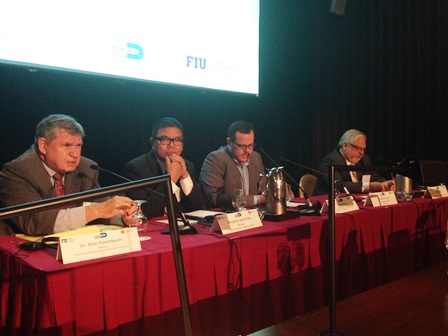
 On December 3-4, 2013, the Organization of American States (OAS) held the Colloquium for Mayors “Towards Sustainable and Resilient Communities in the Americas”. The event sought to catalyze hemispheric cooperation among experts, mayors, and regional partners, bolster regional cooperation, improve the quality of municipal governance and establish a framework for effective collaboration and exchanges between municipal leaders and counterparts in support of sustainable and resilient communities. The Colloquium was jointly organized by the Executive Secretariat for Integral Development (SEDI) of the OAS through its Department of Sustainable Development (DSD), the Permanent Missions of the United States and Colombia to the OAS, Florida International University (FIU), and Miami Dade County. Mayors from the Caribbean, Central America, Colombia, and the United States had the opportunity to share perspectives and experiences with colleagues from other cities in the Western Hemisphere.
On December 3-4, 2013, the Organization of American States (OAS) held the Colloquium for Mayors “Towards Sustainable and Resilient Communities in the Americas”. The event sought to catalyze hemispheric cooperation among experts, mayors, and regional partners, bolster regional cooperation, improve the quality of municipal governance and establish a framework for effective collaboration and exchanges between municipal leaders and counterparts in support of sustainable and resilient communities. The Colloquium was jointly organized by the Executive Secretariat for Integral Development (SEDI) of the OAS through its Department of Sustainable Development (DSD), the Permanent Missions of the United States and Colombia to the OAS, Florida International University (FIU), and Miami Dade County. Mayors from the Caribbean, Central America, Colombia, and the United States had the opportunity to share perspectives and experiences with colleagues from other cities in the Western Hemisphere.
As the Hemisphere continues on a path of accelerated growth, the communities of the region are faced with challenges such as effective public management, productivity and economic growth, infrastructure, housing, transportation, waste management, health, citizen security, and susceptibility to natural and man-made disasters, especially climate change and sea level rise. This trend is generating serious concerns with regard to the ability of municipalities to drive city growth and development in a sustainable fashion.
The Colloquium enabled dialogue on these concerns, capacity building and peer learning, knowledge sharing, and a showcase of advanced technologies for urban sustainability. In their introductory remarks, Ambassador Carmen Lomellin, Permanent Representative of the U.S. Mission to the OAS, and Sherry Tross, Executive Secretary of SEDI, stressed the importance of exploring the challenges of the region and the need to identify potential solutions. Ricardo José Arango, Colombian Manager of the World Urban Forum (WUF)—an international forum bringing together a wide range of participants from around the world to discuss key global urban challenges—highlighted the importance of building frameworks for effective city governance. Arango emphasized the importance of education as a means to promote sustainable development in city management under themes such as equity, financing, and partnerships. He cited the City of Medellin as an example of sustainable urban growth.
Municipal leaders attending the Colloquium voiced their shared concern over the lack of involvement of national authorities in these issues. In this regard, experts Helen Fink, from the United States International Development Agency (USAID), and Michael Donovan, from the Inter-American Development Bank (IDB), advanced ideas of vertical and horizontal cooperation as means to connect the local with the national and trans-boundary. The mayors endorsed continued capacity building through spaces of knowledge and experience-sharing for sustainable development. As a result, the idea of a regional geospatial alliance aroused the interest of participating mayors by providing a solid path to opportunity for the sustainable development of the Western Hemisphere.
Mayors and experts engaged in panel discussions on leadership, innovation and public participation, urban development, vulnerability to natural disasters, open government, sustainable energy, waste management and transportation. They also participated in site visits and briefings on city governance and disaster preparedness at the Port of Miami and the Miami-Dade Emergency Operations hosted by Miami-Dade County, a recognized leader in innovative programs. Participant input contributed to enrich this platform for sharing challenges, solutions and experiences. Mayors and experts stressed the importance of future follow-up events to further dialogue as the exchanges need to be continuous and sustained to yield results.
The Colloquium enabled the establishment of a network aimed at advancing sustainable and resilient development in communities across the Americas. In addition, it provided a forum for preliminary discussions among strategic partners that feeds into the 7th World Urban Forum (WUF7) to be convened in Medellin, Colombia, in April 2014.
 View Map
View Map